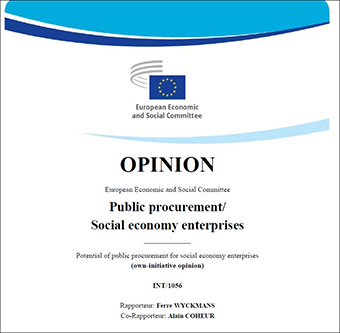The Plenary of the European Economic and Social Committee (EESC) approved on October 23 the Opinion titled “Public procurement and social economy entities”, with Ferre Wyckmans as rapporteur and Alain Coheur as co-rapporteur. The EESC Plenary approved this initiative opinion INT/1056 on October 23 with 237 votes in favor, 1 against, and 4 abstentions.
Through this initiative opinion, the EESC seeks to highlight the potential of public procurement for social economy entities. It emphasizes the recent report by Enrico Letta, titled “Much more than a Market”, which states that social economy entities play a central role in proximity and sustainable territorial development, “embodying the essence of a human-centered economy deeply rooted in local communities”. The EESC welcomes the Letta report, which calls for accelerating the measures of the European Commission’s action plan for the social economy, and underscores the strategic use of public procurement to support the social economy.
The opinion recalls that approximately 250,000 public authorities spend the equivalent of more than 14% of the annual GDP of the European Union, amounting to €15 trillion, through public procurement. It warns that most contracting authorities in Member States continue to award contracts exclusively based on the lowest price or cost, meaning that tender specifications often lack quality criteria or social, environmental, or innovation considerations.
For this reason, the EESC highlights the importance of establishing “innovative criteria with real value, not limited to market-based aspects” for public procurement, and of considering “the added value generated in terms of social aspects (quality employment, inclusion, and integration of vulnerable people), ecological aspects (environmental impact), or territorial proximity”.
In this area, the EESC supports “inspiring initiatives” such as Buying for Social Impact and We Buy Social EU, which, in addition to fostering knowledge exchange, help improve mutual understanding between public authorities and actors in the social and proximity economy.
The EESC calls on the Commission to promptly implement the strategic action plan for public procurement, as recently requested by the EU Council, and urges EU contracting authorities to make better use of market pre-consultations, reserved contracts, and the division of contracts into lots.
Finally, it recalls that such measures are already provided for in the EU Council Recommendation on developing framework conditions for the social economy, aiming to help social economy entities access the market.







